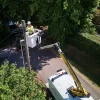Parliamentary Committee Sets Out Plan for UK Internet Regulation

The Joint Committee on the controversial Draft Online Safety Bill (OSB), which was setup to help establish the regulatory framework to help Ofcom tackle “harmful” content online (e.g. hate speech, bullying, terrorism, conspiracy theories etc.), has today published its report. But the tougher rules and tighter offences may not all be workable.
Much of the content that you see online today is governed by a somewhat self-regulatory approach, which has struggled to keep pace with the changing online environment. Various examples exist for “harmful” content, such as the rise of the ISIS terrorist group, as well as state sponsored propaganda from hostile countries, online bullying and the spread of COVID-19 related conspiracy theories etc. Social media firms did eventually catch-up, but they’re often late to the party, while other websites seem to exist solely to promote the worst side of humanity.
The draft Online Safety Bill (OSB), which will be enforced by Ofcom through a new Code of Practice (CoP), is the Government’s response. But in taking on that responsibility, they will also face the unenviable task of trying to strike the right balance between Freedom of Speech and outright censorship, which is what happens when you attempt to police the common and highly subjective public expression of negative human thought.
Advertisement
The Government have always been keen to stress that they want to keep people safe online (especially children) and that any changes must be made in a proportionate way, ensuring that freedom of expression is upheld and promoted online, and that the value of a free and independent press is preserved. In reality, achieving such balance is, again, incredibly difficult and there is a fear that MPs may even exempt themselves from the rules.
The committee’s report
Like it or not, this is not just about policing online platforms, but about policing what YOU all do and say online. Granted, some people go to extremes, but those often cross over into more clearly defined aspects of illegality, while what is being talked about above extends to the murkily ambiguous area of “lawful but still harmful.”
The cross-party Joint Committee on the OSB holds the unenviable task of trying to navigate all of these complex issues in order to find a way through, and their first report aims to provide some answers. On that front, today’s report broadly appears to toughen up the OSB from its original proposal.
For example, companies may now need to appoint one of their senior managers as a ‘Safety Controller‘, who would then become liable for failing to comply with the rules (e.g. when there is clear evidence of repeated and systemic failings). Good luck to anybody taking on (or even wanting!) that job at a major social network, or indeed any company with ANY content generated by internet users.
Advertisement
The return of an explicit duty for all pornography sites to make sure children cannot access them (i.e. Age Verification.. again) has also been resurrected, which is despite the difficulty of actually being able to create and effectively enforce a workable solution. The move may also force sex workers back on to the street, since few people will want to identify themselves via an online ID service before accessing escort sites etc. (least we forget the suicides that followed the leak of personal data from adult dating sites in the past). As always, end-users will just circumvent any website blocks imposed through UK broadband ISPs.
Joint Committee’s OSB Proposals
➤ Big tech has failed its chance to self-regulate. They must obey this new law and comply with Ofcom as the UK regulator, or face the sanctions.
➤ Ofcom should set the standards by which big tech will be held accountable. Their powers to investigate, audit and fine the companies should be increased.
➤ Ofcom should draw up mandatory Codes of Practice for internet service providers. For example, they should write a Code of Conduct on risk areas like Child Exploitation and terrorism. They should also be able to introduce additional Codes as new features or problem areas arise, so the legislation doesn’t become outdated as technology develops.
➤ And they should require the service providers to conduct internal risk assessments to record reasonable foreseeable threats to user safety, including the potential harmful impact of algorithms, not just content.
➤ The new regulatory regime must contain robust protections for freedom of expression, including an automatic exemption for recognised news publishers, and acknowledge that journalism and public interest speech are fundamental to democracy
➤ Scams and fraud generated in an aim to tackle harmful advertising such as scam adverts. Paid-for advertising should be covered by the Bill.
➤ Service providers should be required to create an Online Safety Policy for users to agree with, similar to their terms of conditions of service.
The Committee also believes the Bill should be clearer about what is specifically illegal online. They believe it should not be up to the tech companies to determine this. The Committee therefore agrees with the Law Commission’s recommendations about adding new criminal offences to the Bill. They recommend that:
➤ Cyberflashing be made illegal.
➤ Deliberately sending flashing images to people with photosensitive epilepsy with the intention of inducing a seizure be made illegal (known as Zach’s law).
➤ Pornography sites will have legal duties to keep children off them regardless of whether they host user-to-user content.
➤ Content or activity promoting self-harm be made illegal, such as it already is for suicide.
➤ The report recommends that individual users should be able to make complaints to an ombudsman when platforms fail to comply with the new law. They also recommended that a senior manager at board level or reporting to the board should be designated the “Safety Controller.” In that role they would be made liable for a new offence: the failure to comply with their obligations as regulated service providers when there is clear evidence of repeated and systemic failings that result in a significant risk of serious harm to users.
On the upside, the report does call for the bill to tackle “harmful advertising” (e.g. scam adverts) and, perhaps mercifully, it seems to avoid prior attempts to ban the use of end-to-end encryption, such as on internet messaging applications, which many felt would have been technically unworkable – E2E encryption is widely used (this very web page uses it, like most websites) and is a process that any coder can add.
The report also argues that the definition of “illegal content” in the OSB is currently “too dependent on the discretion of the secretary of state“, which could result in Ms Dorries’ having some of her proposed powers softened.
There may be troubles ahead..
Balancing all of this against complex issues of context (e.g. people joking about blowing up a city in a video game vs actual terrorists), satire or parody, application of the rules to non-UK based sites, political speech and the risk from overzealous automated filtering systems – since manually moderating all content on major platforms would be economically impossible – is going to be a nightmare to get right.
Advertisement
Equally, it doesn’t help that the Government may yet shop the definition of what is “harmful” out to commercial companies to decide. Suffice to say that many people in the industry are concerned that, in practice, big parts of the new bill may be unworkable in the real-world, at least not without causing significant problems (e.g. too many legitimate pieces of content being removed and Ofcom being swamped with requests).
On top of that, there are huge debates around issues of online anonymity and whether everybody should have an online ID or go through a fallible Age Verification system, which may conflict with the current privacy laws. Creating such a system would be hard enough and raises its own questions. For example, we don’t all want to talk online about personal issues of sexuality, health and domestic violence from an identifiable account, for obvious reasons!
In addition, it seems highly unrealistic to expect every website, in the UK or otherwise, to be able to implement and pay for such systems – from small personal blogs to big social media firms. Ensuring compatibility across masses of third-party software could also take many years, if that were even realistic (most UK sites use software created in other countries, which cannot easily be changed).
Meanwhile, we’re still left with plenty of questions, such as how long will such platforms be given to remove “harmful” content? A time span of just 1 hour was mentioned before, but that is unworkable on smaller sites (we humans need to sleep, travel, shop and take breaks etc.) and, on bigger sites, would encourage automated filtering. Faced with this, many sites may simply close down their discussion sections to avoid liability and huge fines, which would be a horrific and chilling outcome for Freedom of Speech.
Damian Collins MP, Chair of the Joint Committee, said:
“The Committee were unanimous in their conclusion that we need to call time on the Wild West online. What’s illegal offline should be regulated online. For too long, big tech has gotten away with being the land of the lawless. A lack of regulation online has left too many people vulnerable to abuse, fraud, violence and in some cases even loss of life.
The Committee has set out recommendations to bring more offences clearly within the scope of the Online Safety Bill, give Ofcom the power in law to set minimum safety standards for the services they will regulate, and to take enforcement action against companies if they don’t comply.
The era of self-regulation for big tech has come to an end. The companies are clearly responsible for services they have designed and profit from, and need to be held to account for the decisions they make.”
The bill will now go back to the UK Government (DCMS) for a final decision on what to include, with a view to presenting it back to Parliament around early Spring 2022. But as a legal text it seems set to be incredibly complex and risks trying to micromanage free speech by making it harder to speak freely in the first place (i.e. making it so difficult for platforms to allow that they overblock or simply remove the ability to have any say in order to avoid liability).
Finally, we can’t always assume that our society will, in the future, be governed by a truly democratic system that protects our freedoms and privacy. Giving a future anti-democratic government such control over what we can access and how we communicate would thus seem to be unwise. Future mission creep could easily make it much more dangerous.
Likewise, it remains unclear how far the new rules will go toward tackling conspiracy theories and fake news, which some politicians often exploit for their own gain. But if speech is only deemed “free” when it can be found to be objectively and demonstrably true, then that masks other problems – consider the case of different “religions” while you ponder this.
As it stands, the Government faces an incredibly difficult balancing act. On the one hand they need to do more to tackle harmful online content, but on the other they have to avoid the risk of creating a Draconian censorship regime and harming free speech, even though that might not be their intention.
Given the poor grasp that most politicians seem to have over the internet, we fear they will not get this balance right, and the consequences of that could be huge. The report reiterates the old trope – “What’s illegal offline should be regulated online,” but these proposals seem to mean that speech will be less free online compared to offline.
Finally, for those who might be hoping that the OSB solves what some view as “the Facebook problem” (replace Facebook with Twitter etc. if you must). Just remember, if you impose a heavy regulatory model that treats all web sites and internet content services as if they were the same size and have the same resources as Facebook, then all you do is destroy everything that isn’t Facebook. The result is more Facebook, only Facebook.. nothing but Facebook.
Mark is a professional technology writer, IT consultant and computer engineer from Dorset (England), he also founded ISPreview in 1999 and enjoys analysing the latest telecoms and broadband developments. Find me on X (Twitter), Mastodon, Facebook, BlueSky, Threads.net and Linkedin.
« BT Takeover Fears Mount as Altice UK Boost Stake to 18 Percent UPDATE
Rural Broadband ISP Truespeed Start Glastonbury FTTP Rollout »






















































Seems pretty standard for UK tech legislation – Failure to understand the technology and unworkable enforcement (good luck enforcing this on an American site). Without enforcing something as draconian as the great firewall of China this isn’t going to work (Ever heard of a VPN?). I can’t decide if our politicians are just clueless, use to shouting and getting there own way or its just propaganda for the papers so they can pretend they are doing something?
The government sees a free Internet as a threat, and they will never stop trying to control/censor it.
I am sure they’d enact a Great Firewall today if they thought they could get away with it.
With the opposition Labour currently offers, they’d probably steamroller it through especially when Boris is so adept at smoke and mirrors.
I wouldn’t give them any idea’s Mike.
Not sure what you think Labour can do against a majority of 80.
People voted to allow the Tories to do as they please knowing full well they are authoritarian liars because they liked why they were lying. Tough.
I don’t see labour opposing anything, so they are not an opposition. We live in a one-party state.
Well put. Pirate sites are already blocked, so probably only a matter of time before a great firewall becomes a reality
Labour have been generally supportive of the OSB and even called for some measures to be toughened. So while I’d disagree that we’re in a one party state, on this specific bill I do perceive there to be a lack of credible opposition.
Here we go again. A bunch of luddites that don’t know how encryption works are intent on weakening it using children’s safety as subterfuge. The real goal is complete surveillance of all people online everywhere under the guise of keeping your teenager safe.
It’s all hogwash. None of the big boys are going to accept the UK telling them hey apple/fb/google please weaken your encryption. If internet access is a human right, then what effect does government censorship have on that human right?
“Harmful content”.
Today, it’s “terrorism” and “bullying” and “Cybercrime”.
Tomorrow, it’s whatever the government de jour doesn’t like today.
This is a very slippery slope to the UK gov censoring the internet. I’d imagine a number of tech giants will probably pull out of the UK if they go ahead with their half baked plan.
Did you forget to change your name before you replied to your own post?
No I forgot to add the next part in ?
Let me guess, they want to censor “”conspiracy theories”” which just mean people saying things they don’t like.
Funny, because I don’t see any plans to censor people who believed the Trump/Russia collusion conspiracy theory. Or the plans to censor people who believe Kyle Rittenhouse is a “white supremacist” conspiracy theory. Or the conspiracy theory that Jussie Smollett was attacked by “Trump supporters”, now found guilty for faking his own hate crime, LOL.
Ultimately, the Tories are just Neo-Nazi scum. And they know it.
Like perhaps Boris’s booster roll-out smoke and mirrors exercise to inoculate perfectly healthy people from a runny nose, all whilst cancelling routine operations and allowing cancer patients to die because they don’t get their treatment they so badly need?
All to change the narrative from Boris’s 2020 party during lockdown?
oops I’m a conspiracy theorist myself now, guess that must make me a nutjob eh? oh dear.
It was abundantly clear you’re a nutjob with a forest on their shoulder well before you made that comment.
How does anyone manage to get this far without realizing that a) vaccination is for healthy people, for the purpose of helping to keep them healthy, b) the booster rollout is for COVID-19, not a runny nose, and c) without it, we’d need to be cancelling a lot more operations than we currently are?
Really boggles the mind.
The UK is starting to sound a lot more like China.
No, we haven’t gone that far yet.
But, who knows what might happen in further down the line.
“Freedom of Speech” (…) “But there are limits”… OK, freedom with limits is no longer freedom. Or, we do not say freedom of speech. Today, we are in a permanent world of controlled language. Likewise, I do not have any freedom at all when driving or walking. I can’t walk on the road when there ara cars. Freedom only exists in your thoughts (for the moment). You are absolutely free to think about anything without the State knowing. There is no freedom of speech as such. What are the limits? If I openly tell online that I dislike very much an MP or some random person, or if I critize this person, will my post be flagged as hate speech? If someone is overly sensitive to my comment, this person can tell the police. Simple. The police will ALWAYS be able to reach me, whether I’m anonymous or not. No one is anonymous on the Internet. With enough deployed resources, at least for a regular person who has not the skill to evade detection, it will always be possible to reach you at your physical address.
Well I for one support this.
Protecting children is important. As is weeding out any undesirable content from the Internet.
Anyone against this should be added to a list.
Wow Ken, I’d like to think your post was satire, but I doubt it.
‘Protecting children from the internet’ quite possibly, as your post conveys at the end, the easy out for pushing anything you want through law or policy while branding anyone who question it as a pervert etc, etc.
As for ridding the internet of ‘undesirable content’ that’s a very subjective catch all. Undesirable to whom exactly ? If you’d said ‘illegal’ maybe less so.
Your a scary kind of person
We don’t have freedom of speech in the UK. And we will never have freedom of speech while Section 5 of the Public Order Act is on the statute books. That law is completely incompatible with freedom of speech.
We do however have a right to freedom of expression. Although the way things are going in this country I wouldn’t be surprised if that was eradicated soon.
Too many people in this country have become all to eager to give up personal rights and freedoms in the name of noble causes. It’s a big mistake. Once the state has taken away those freedoms, it’s very rare you ever get them back. History has taught us that.
In my opinion, fighting for protecting our personal rights, freedoms and privacy is more important than protected children when looking at the bigger picture. I’m not saying protecting children is not important, it is. But we cannot give up our privacy, rights and personal freedoms to do it. And to say that a person that holds my opinion should be added to list is a very narrow minded view.
Stop voting conservative….
My VPN will cure this problem.